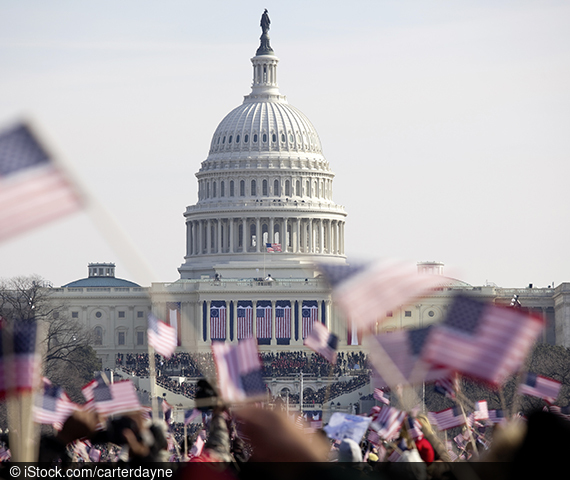Interest Groups in the US Influence Voting Behaviour on Contested Bills
ResearchZEW Study on Campaign Financing in the USA
Vote buying your way to a majority: interest groups increase their donation activity to members of the US House of Representatives in order to push through contested bills with a narrow majority. Members who are known to be indifferent or undecided are most likely to be targeted by interest groups. During election years, campaign finance donations from interest groups increase around voting dates of contested bills. These are the results of a study conducted by ZEW Mannheim together with the University of Basel, the University of St. Gallen, and the Free University of Bozen-Bolzano.
The study examines how campaign contributions and legislative decisions are related, and whether campaign donations actually influence the voting behaviour of members of the US House of Representatives with respect to their legislative decisions. The study focuses on bills that were passed or rejected by a narrow margin, i.e. with a yes vote share of just below or just above 50 per cent. The results are based on data on roll-call votes and campaign contributions in the US House of Representatives between 1990 and 2014. Data on roll-call votes and bills is based on publications of the US House of Representatives, the Library of Congress, and the US Government Publishing Office (GPO). Data on individual campaign contributions was provided by the Center for Responsive Politics (CRP).
The study indeed documents a link between well-timed campaign donations from interest groups and the adoption of contested bills. Members of the US House of Representatives are systematically more likely to narrowly pass bills than to narrowly decline them. The researchers considered total daily campaign contributions to members of the House around the time of roll-call votes over a period of four weeks before and after the voting day. Donations to members during this period are, on average, higher for bills passed by a narrow majority than for bills rejected with the same narrow margin. In the four weeks before and after the vote the daily total of donations is on average about 190,000 US dollars higher around bills narrowly passed than around bills that were narrowly declined. This suggests that the surplus of yes votes is systematically related to the interests of campaign donors.
Interest groups predominantly make donations to members who are still undecided
The bulk of donations goes to members who seem willing to pass the respective bills but are still considered undecided. “It’s above all these indifferent members of the House which interest groups target. Lobbyists therefore need to know as much as possible about the attitudes and preferences of the members of the House to adjust their activities accordingly,” explains co-author of the study Dr. Michaela Slotwinski, from ZEW’s Research Department “Social Policy and Redistribution”.
The study also shows that the activities of interest groups have a much greater impact in election years; the difference in donations between barely won and barely lost votes in the four weeks before and after the vote during election years is on average 280,000 US dollars. This is most likely due to legislators being in need of increased financing during their election campaigns.
The authors furthermore observed a time pattern of systematic irregularities in donations around the date of the vote. Donations already show their effect before the voting result can be observed, meaning that precisely timed donations have an effect on the voting regarding contested bills, and not vice versa. Financing activities are most intensive in the period of about ten days before the vote to the day after the vote, as well as in the period of 15 to 24 days after the vote during election years. Money could be a motivating factor immediately before the vote and become a reward after it.
Donations are an effective instrument to push through contested bills
“If a bill is controversial and the result of the vote is likely to be decided with a relatively narrow margin, the vote of a single legislator or a small number of legislators is decisive for the rejection or adoption of the bill. For interest groups this means that the marginal utility of the required 50 per cent rises sharply. So, convincing another member to vote yes via a high donation becomes cost-efficient,” says Michaela Slotwinski.
“Interest groups generally provide financial support to members of the House with whom they share similar political positions. Both sides are influencing each other: interest groups support members whose voting behaviour to date has been geared to the political preferences of the interest groups, and the representatives in turn adjust their voting behaviour on the basis of donations from interest groups. This typically makes a clear identification of the causal direction of this relationship quite difficult. Our study now presents a new approach of how this problem can be approached,” explains Michaela Slotwinksi.
